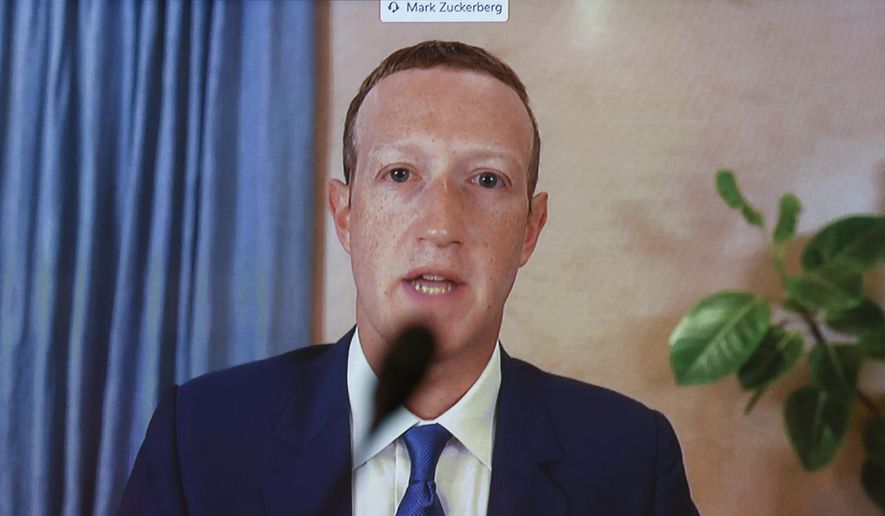The federal government, 46 states and the District of Columbia filed antitrust lawsuits against Facebook on Wednesday charging that the social media giant is unlawfully working to eliminate its competition.
The lawsuits, filed in federal court, preview Big Tech’s bitter battle with government officials next year, which could end with a judge forcing Facebook to spin off Instagram and WhatsApp.
The Federal Trade Commission’s lawsuit wants a federal judge to act to undo Instagram and WhatsApp’s affiliation with Facebook entirely. It says Facebook bought the two messaging services in an effort to squash any competition.
“Facebook’s actions to entrench and maintain its monopoly deny consumers the benefits of competition,” Ian Conner, director of the FTC’s Bureau of Competition, said in a statement. “Our aim is to roll back Facebook’s anticompetitive conduct and restore competition so that innovation and free competition can thrive.”
The FTC’s lawsuit, filed in the U.S. District Court for the District of Columbia, argues that Facebook has had monopoly control of the personal social networking realm for much of the past decade.
“Since toppling early rival Myspace and achieving monopoly power, Facebook has turned to playing defense through anticompetitive means,” the lawsuit said. “After identifying two significant competitive threats to its dominant position — Instagram and WhatsApp — Facebook moved to squelch those threats by buying the companies, reflecting CEO Mark Zuckerberg’s view, expressed in a 2008 email, that ’it is better to buy than compete.’”
The 46 states, Guam and the District of Columbia also filed a lawsuit in a federal court in D.C. arguing that Facebook illegally maintained monopoly power via a “buy or bury” strategy. The states that did not join the lawsuit are Alabama, Georgia, South Dakota and South Carolina.
“Facebook’s unlawfully maintained monopoly power gives it wide latitude to set the terms for how its users’ private information is collected, used and protected,” the states said in the lawsuit. “In addition, because Facebook decides how and whether the content shared by users is displayed to other users, Facebook’s monopoly gives it significant control over how users engage with their closest connections and what content users see when they do.”
Facebook is the world’s biggest social network, with 2.7 billion users. Its founder and CEO, Mark Zuckerberg, is the world’s fifth-richest individual and the most public face of Big Tech.
Facebook blasted the FTC’s litigation as an act of “revisionist history.”
“The most important fact in this case, which the Commission does not mention in its 53-page complaint, is that it cleared these acquisitions years ago,” Jennifer Newstead, Facebook vice president and general counsel, said in a statement. “The government now wants a do-over, sending a chilling warning to American business that no sale is ever final. People and small businesses don’t choose to use Facebook’s free services and advertising because they have to, they use them because our apps and services deliver the most value. We are going to vigorously defend people’s ability to continue making that choice.”
The company’s stock tumbled about 2% to $277.92 Wednesday. It recovered slightly after dropping 3.3% when the FTC lawsuit was announced.
Republican and Democratic lawmakers have expressed an interest in cracking down on Big Tech, and the litigation against Facebook brought bipartisan approval from House Judiciary Committee Chairman Jerrold Nadler, New York Democrat, and Rep. Ken Buck, Colorado Republican and Judiciary Committee member.
The committee’s antitrust subcommittee began investigating Big Tech last summer and questioned Mr. Zuckerberg at a hearing in July. The committee’s subsequent report on its findings called on the FTC to take action against Big Tech and recommended a revival of antitrust enforcement from the federal government.
Free market advocates, such as those at the libertarian-leaning Competitive Enterprise Institute, swiftly condemned the FTC and state attorneys general. Jessica Melugin, associate director of the institute’s Center for Technology and Innovation, branded the litigation as “political theater dressed up as antitrust law.”
“The FTC suit asserts that Facebook acquired Instagram and What’sApp to suppress competition. But when viewed through the lens of the U.S. antitrust law standard of consumer harm, the question becomes, so what?” Ms. Melugin said in a statement. “Facebook’s superior resources and expertise took Instagram from a modest and glitchy app to one with a billion users as of 2018.”
The bipartisan litigation by the states signals that the attorneys general will fight tooth-and-nail to smash Facebook irrespective of the obstacles ahead.
The liberal Open Markets Institute praised the attorneys general and FTC’s intervention to rein in Facebook’s power.
“Facebook’s role as a gatekeeper of speech has had devastating impact on the marketplace of ideas, the public sphere of debate, and our elections. The platform’s monopolistic control of information flow allows Facebook to pick the winners and losers of speech based on what maximizes its profits — and the winner is disinformation,” Sally Hubbard, Open Markets Institute director of enforcement strategy, said in a statement. “Facebook has maintained its monopoly power not by outperforming competitive threats, but rather by muscling them out of the competition altogether or by buying them.”
• This article is based in part on wire service reports.
• Ryan Lovelace can be reached at rlovelace@washingtontimes.com.




Please read our comment policy before commenting.